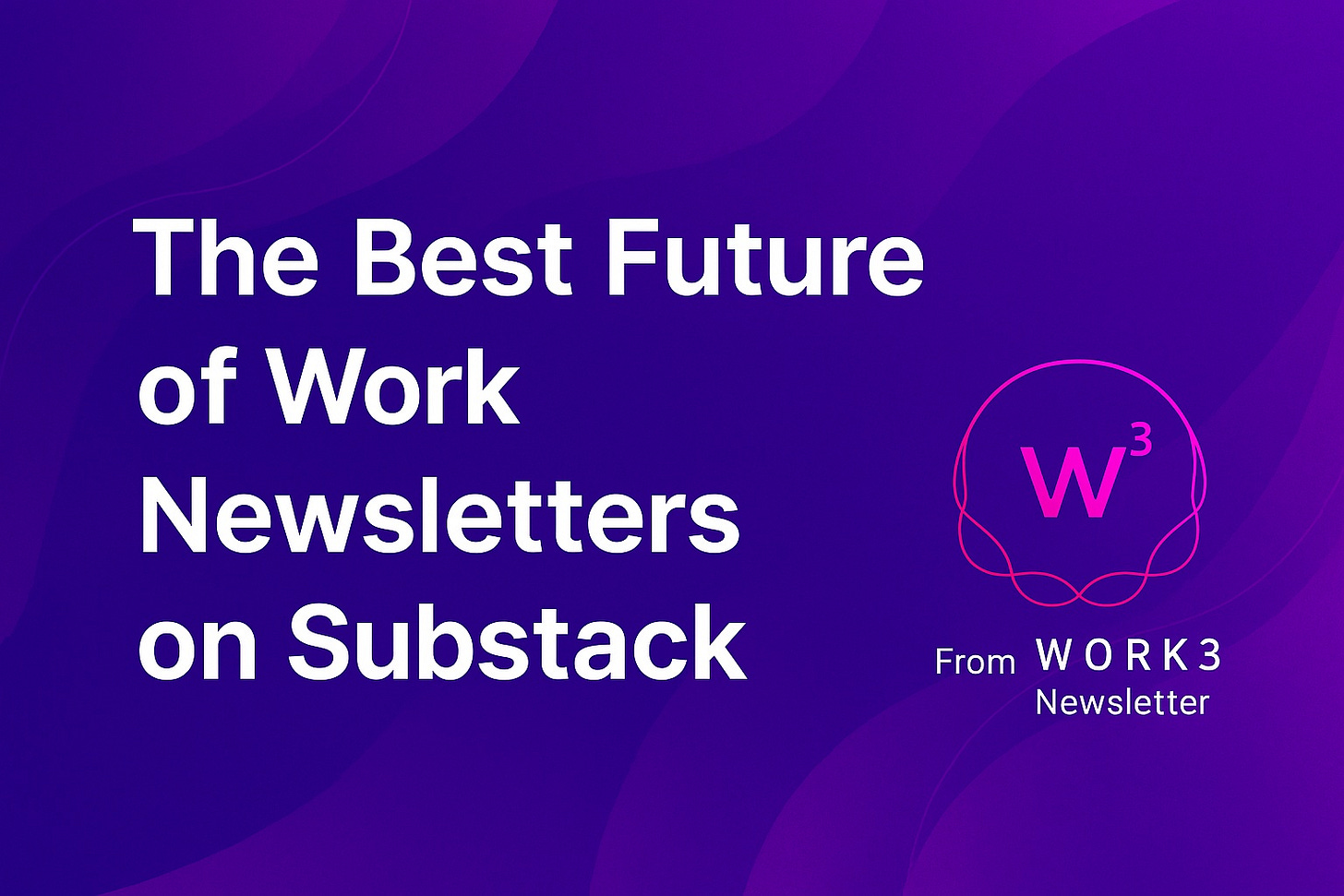The Best Future of Work Newsletters on Substack
the smartest newsletters reshaping how we think about work
At Work 3 Newsletter, we don’t see the future of work as a single trend to track — but rather a swirling, global ecosystem full of contradictions, experiments, and shifting power dynamics.
It’s not one future, but many.
We cast our net far ahead for emerging signals, scan behind us for patterns in history, and widen our lens to include different people, geographies, and points of view.
This article is part of an ongoing series where we spotlight some of the best writing on Substack related to the future of work — a platform now home to more than 20 million active subscribers and 50,000 income-earning writers.
In this edition, we cover the impact of the rise of AI agents, career advice for kids, to why so many midlife women are walking out of corporate jobs. Inspired by TV, we look at identity crises in the workplace, and share AI prompt templates that are already reshaping HR workflows.
Most of the newsletters featured here are free to read, and all are written by thinkers who publish regularly and help us ask better questions about the future we're building.
👇 Let us know in the comments — which are your favourite newsletters that explore the future of work?
The Third Workforce: From Analog Labor to Agentic Labor - Digital Native - Rex Woodbury
Rex is an investor by day and a horizon watcher by night.
In his recent article, The Third Workforce: From Analog Labor to Agentic Labor, he asks the question ‘How do you build for ‘non-human economic participants?’ which we have been obsessing about recently at Work 3.
Rex sees three distinct phases of work:
Phase I: The Analog Workforce (pre-2000s)
Phase II: The Digital Workforce (2000s to early 2020s)
Phase III: The AI Workforce (2020s and beyond)
With the first two phases being human-centric, with Phase III introducing non-human economic participants.
I would always throw in Carlota Perez’s theory to interpret Technology Trends and what tends to happen, and don’t agree with all the Hot Takes e.g. AI Agents may need Labor Rights (AI are still tools like Excel - so is this a bit of anthropomorphism?), but there are some great insights including :-
🔥 Hot Take 2: Most SaaS will go obsolete
🔥 Hot Take 5: Agent-to-agent (A2A?) transactions are coming
Read more here.
Career Advice for a Seven Year Old - #MajorRelate - Dr Eliza Filby
#MajorRelate newsletter explores how generational shifts are shaping the way we live, work, parent, and connect. It is written by Dr. Eliza Filby, historian and author of Inheritocracy.
I am not sure I received decent career advice until I was about 25 years old. My parents were mystified with my choice to study for four years without a job with the same name as the degree. Many of my friends developed long careers from the 1st decent job offer they received.
When young’uns ask me for career advice, I do shudder slightly. In her article, Dr Eliza Filby offers some career advice for her seven year old, and starts with an important caveat :-
Mass education is inevitably about standardisation, and our kids should be moving in the opposite direction in the age of AI.
So don’t expect the education system to teach relevant skills.
I agree with much of this advice, and these stand out.
Career Paths Are Dead, But the Path to Mastery Has Never Been More Open
Solopreneurship Is the Future of Employment
Find Your Niche by Connecting Unconnected Worlds
And Good luck getting a seven year old to sit down for 15 minutes to listen to this!
Read more here.
Has your job become your identity? What TV show Severance tells us about work - Make Work Better - Bruce Daisley
Anyone who tries to make work better is our friend and after having senior roles at Google and Twitter, Bruce Daisley is now presumably paying for his sins.
Television and movies have offered many a critique, sometimes amusing, of corporate life.
From The Office, to Silicon Valley to Black Mirror (see Fifteen Million Merits)
In the real world, I have seen my fair share of soulless cubicles and meaningless meetings, but the TV show Severance is pretty bleak.
In his article, Bruce asks - DANGER: has your job become your identity? What TV show Severance tells us about work.
Many of us are familiar with our company asking us to bring our whole selves to work (something that I have an issue with as it is often used inappropriately). In Severance, work doesn’t just ask for our whole selves, it becomes our whole selves
Severance imagines a world where workers are offered a procedure that disconnects their consciousness at work from their consciousness in their domestic lives. This helps them survive 16 hour work days and daily oppression.
We all play different roles in life and have to compartmentalise to some extent.
Would you like to try the ultimate way to disconnect from work?
Now you can give it a go from the comfort of your sofa.
Read more here.
ChatGPT Prompts for HR - FullStack HR - Johannes Sundlo
As well as being obsessed about the future of work and HR, Johannes has a day job as a HR Leader in the Games Industry in Sweden and has worked at Spotify.
Rather than just postulate about the impact of AI at work, Johannes has made it easier for thousands of people to use AI in our day-to-day work.
His most popular articles have included ChatGPT Prompts for HR, I include a few here :-
How might HR need to adjust executive recruitment strategies and channels to reach diverse enterprise-level [job title] talent?
How can HR operations utilize AI, automation and smart workflows to improve efficiency and experience for [job title]?
What people analytics capabilities are needed within HR to uncover insights and trends impacting [job title]?
Read more here.
Why are midlife women walking out of corporate jobs? - Laetitia@Work
The best future of work newsletters have a particular purpose or focus, for example, investors or making work better. The focus for Laëtitia Vitaud, is the future of work with a feminist perspective.
Workforce data shows all sorts of people leaving traditional employment for many types of reasons, but Laëtitia asks, Why are midlife women walking out of corporate jobs?
Many reasons are given why, from the organisation demanding sacrifices that their caregiver role does not allow them to maintain, and old fashioned ageism and sexism.
Every day I hear of women leaving the workforce because they have simply had enough of corporate life and want to do something better. Thankfully this includes a massive move to entrepreneurship and freelancing, which Forbes has called the “the new entrepreneurial superpower”.
Read more here.
Conclusion
This is just a snapshot of the rich conversations happening across Substack about work, identity, technology, and what comes next. Whether it's AI reshaping labour markets, generational shifts redefining career paths, or the quiet exodus of midlife talent from the corporate grind — these writers are helping us all think a little deeper, and dream a little bigger.
In future editions, we’ll be spotlighting new writers, diving deeper into niche themes, and expanding our scope to include more global voices.
Subscribe, share, and most importantly — start conversations.
That’s how we build better work.
Got a newsletter recommendation we should feature next?
Drop it in the comments or hit reply.
STOP PRESS! You can now read Part 2 of our Best Future of Work Newsletters
Lifelong learning,
Andy








Thanks a lot for the mention! And right back at you!
Thanks for the share. Some great thought provoking articles and particularly liked your pointed comments about prompt engineering.